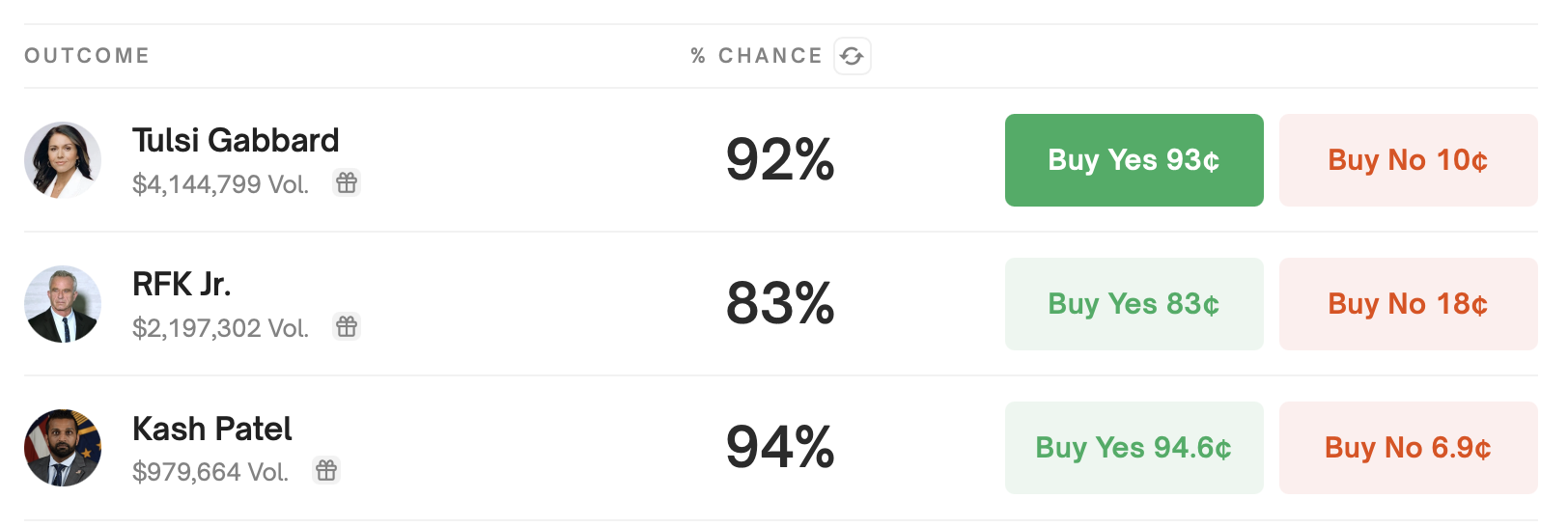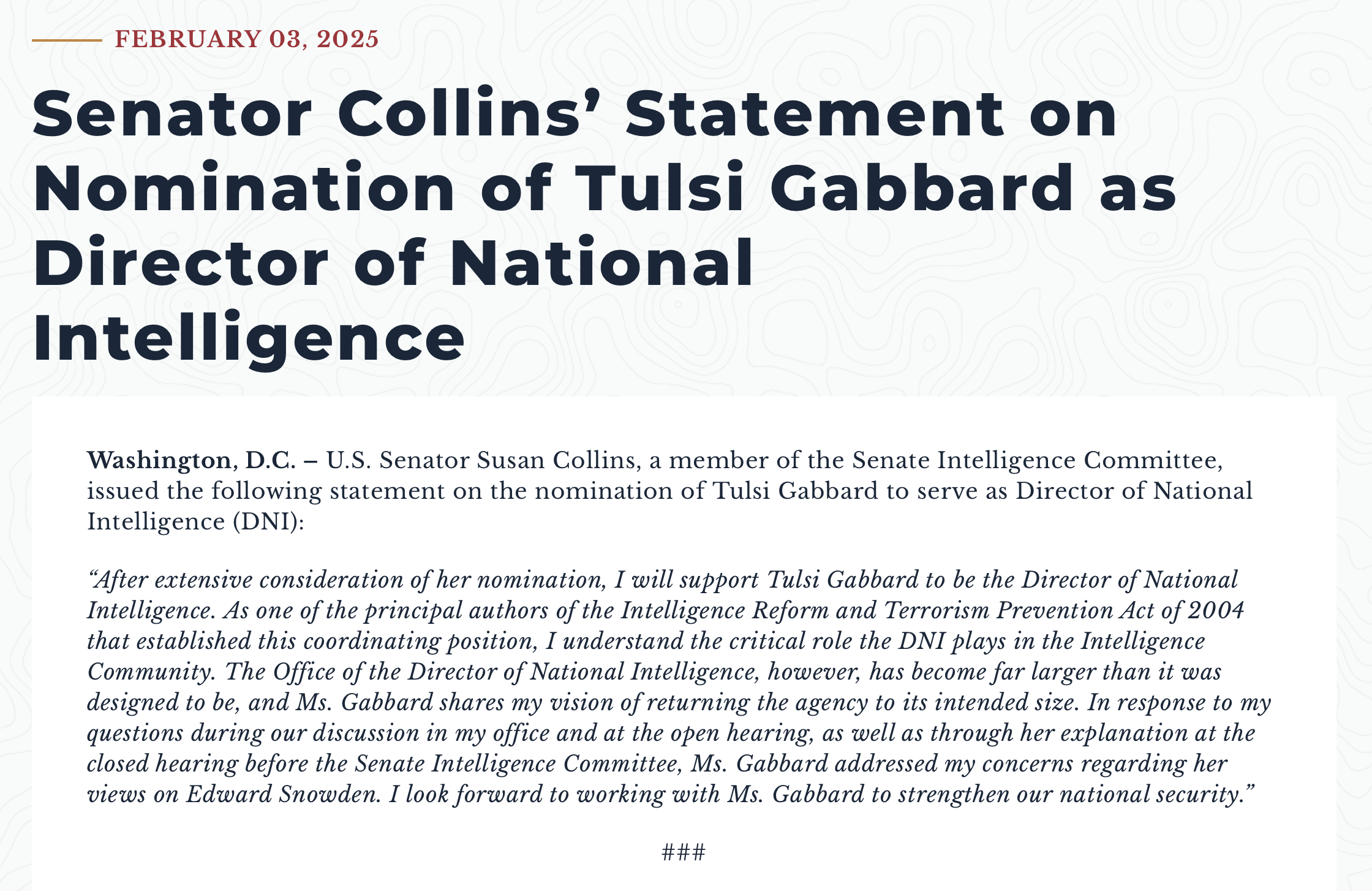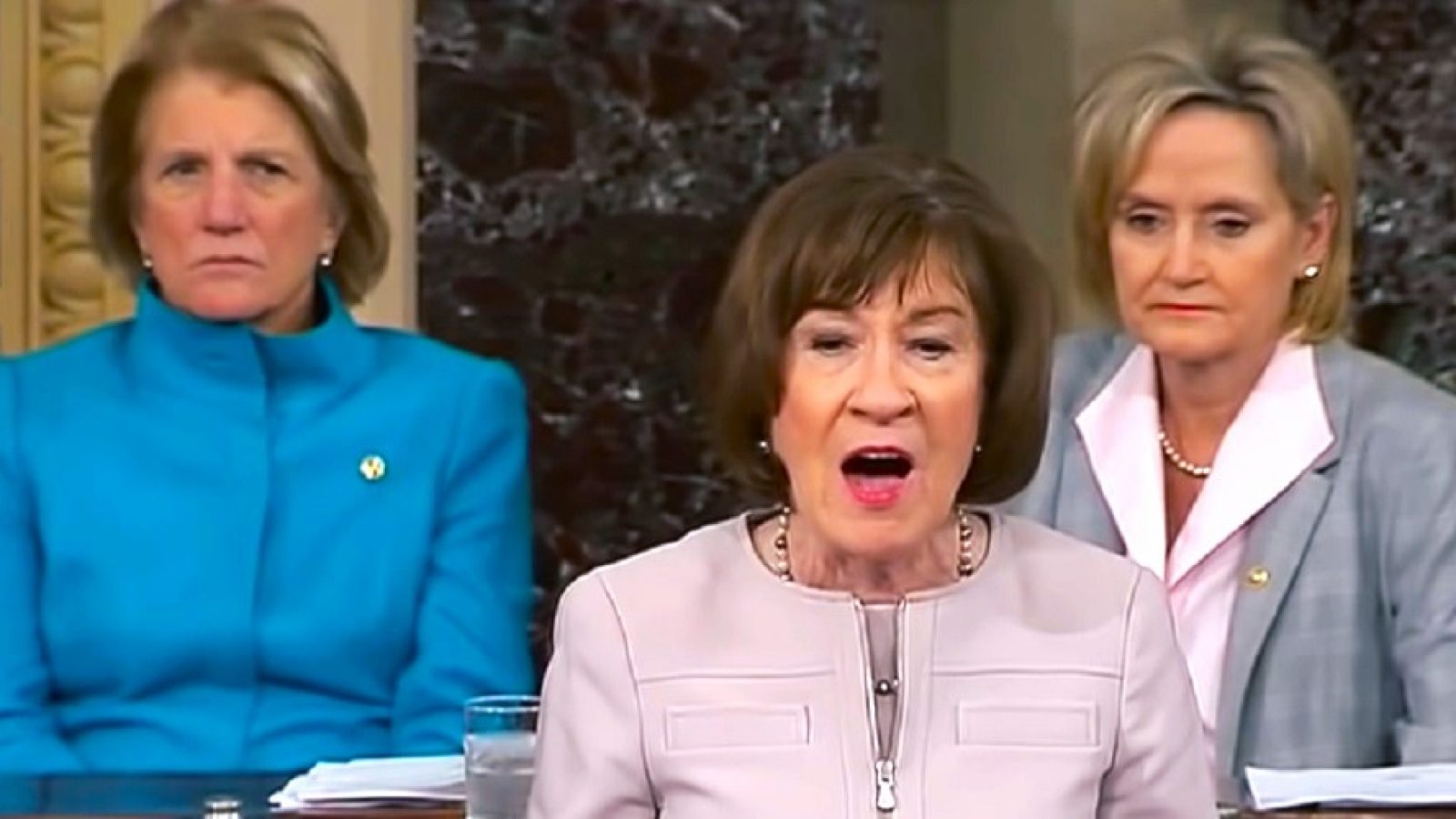I did not see this one coming, but I am so happy to tell you that RINO Senator Susan Collins from Maine just confirmed she’s voting “YES” for Tulsi Gabbard!
It was only three days ago that we brought you this report, saying Tulsi Gabbard’s odds of being confirmed stood at a concerning 52%:
Here Are The Current Odds That RFK Jr., Kash and Tulsi Get Confirmed
Now in light of the new endorsement from Susan Collins, those odds just jumped to a healthy 92%!

EXCELLENT!
RFK Jr. now is in the most jeopardy, but still sits at 83% likely to be confirmed.
The news came directly from Sen. Collin's website:

FULL TEXT:
Senator Collins' Statement on Nomination of Tulsi Gabbard as Director of National Intelligence
Washington, D.C. - U.S. Senator Susan Collins, a member of the Senate Intelligence Committee, issued the following statement on the nomination of Tulsi Gabbard to serve as Director of National Intelligence (DNI):
"After extensive consideration of her nomination, I will support Tulsi Gabbard to be the Director of National Intelligence. As one of the principal authors of the Intelligence Reform and Terrorism Prevention Act of 2004 that established this coordinating position, I understand the critical role the DNI plays in the Intelligence Community. The Office of the Director of National Intelligence, however, has become far larger than it was designed to be, and Ms. Gabbard shares my vision of returning the agency to its intended size. In response to my questions during our discussion in my office and at the open hearing, as well as through her explanation at the closed hearing before the Senate Intelligence Committee, Ms. Gabbard addressed my concerns regarding her views on Edward Snowden. I look forward to working with Ms. Gabbard to strengthen our national security."
I find it interesting that when she announced she was voting "NO" on Pete Hegseth she proudly posted that news to X:
After careful consideration, I have decided to vote against Pete Hegseth’s nomination for Secretary of Defense. While I appreciate his courageous military service and his ongoing commitment to our servicemembers and their families, I am concerned that he does not have the…
— Sen. Susan Collins (@SenatorCollins) January 23, 2025
Now, when she announces a "YES" for Tulsi Gabbard, she hides it on her website (which almost no one reads).
Perhaps she will also post it on X in the future, but as of press time for this article, no post was present on X under her profile.
The Press Herald was actually the first to break the news:
U.S. Sen. Susan Collins announced on Monday that she will vote to confirm Tulsi Gabbard as director of national intelligence.
Gabbard’s nomination was believed to be on shaky ground after last week’s confirmation hearing before the U.S. Senate Select Committee on Intelligence, on which Collins and Sen. Angus King serve.
Prior to that hearing, Collins expressed concerns about Gabbard’s past efforts to end warrantless wiretapping of foreign targets, which some senators said accounts for 60% of the president’s daily briefing. She was also concerned about Gabbard’s past support for Edward Snowden, a former defense contractor who exposed the U.S.’s broad surveillance program and is now exiled in Russia.
Although Gabbard refused to call Snowden a traitor during the hearing, she told Collins that she would not seek a pardon for Snowden.
Collins said she supports Gabbard’s focus on narrowing the scope of the national intelligence program, which began after the 9/11 terrorist attacks and has since grown is jurisdiction.
“I understand the critical role the DNI plays in the Intelligence Community,” Collins said in a written statement. “The Office of the Director of National Intelligence, however, has become far larger than it was designed to be, and Ms. Gabbard shares my vision of returning the agency to its intended size.”
Collins referred to additional answers she received in a closed confirmation hearing.
“In response to my questions during our discussion in my office and at the open hearing, as well as through her explanation at the closed hearing before the Senate Intelligence Committee, Ms. Gabbard addressed my concerns regarding her views on Edward Snowden,” she said. “I look forward to working with Ms. Gabbard to strengthen our national security.”
ADVERTISEMENT
Now for the big question probably on everyone's mind....
When will we finally get these votes?
And what is causing the delay?
The short answers are: UNKNOWN and DEMOCRATS.
The follow up question you might have is: If the Republicans control the Senate, why are they not able to push this to a vote immediately?
The procedure in the Senate is a bit murky and purposefully opaque, but here's some insight:
In the U.S. Senate, while the majority party (in this case, the Republicans) has significant control over the legislative agenda, there are procedural mechanisms that can be used by the minority party (Democrats) to slow down or delay the confirmation process. Here's how this works:




Join the conversation!
Please share your thoughts about this article below. We value your opinions, and would love to see you add to the discussion!